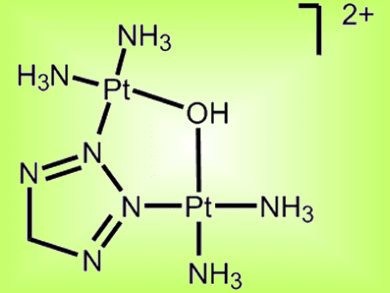cis-Diamminedichloridoplatinum(II) (cisplatin) is one of the most commonly used anticancer drugs. Although platinum-based chemotherapy can cause serious side effects, its efficacy has prompted the design and synthesis of next-generation anticancer platinum(II) drugs which are effective against cancers that are typically resistant to chemotherapy, such as lung cancer and pancreatic cancer.
Masahiko Chikuma and co-workers, Osaka University of Pharmaceutical Sciences, Japan, have made a Pt(II) complex with remarkably high activity against pancreatic cancer. The complex is dinuclear, with a tetrazolate moiety bridging the two Pt centers. It was tested in vivo and was shown to inhibit tumor growth by 99 % relative to the untreated control.
Pancreatic cancer remains the fourth leading cause of cancer-related deaths in the United States.
- A Tetrazolato-Bridged Dinuclear Platinum(II) Complex Exhibits Markedly High in vivo Antitumor Activity against Pancreatic Cancer
S. Komeda, Y.-L. Lin, M. Chikuma,
ChemMedChem 2011.
DOI: 10.1002/cmdc.201100141



